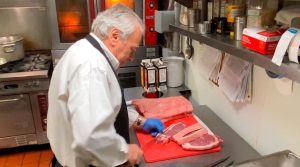OHIO — Now that we are in a new year, many new laws will take effect in our state.
One of those laws is Senate Bill 102, which changes some of Ohio’s liquor laws. The bill was made possible because of one Wooster homebrewer who fought hard for his cause.
His name is Elmer Steingass.
This is Elmer Steingass. But his friends call him “Goose.” The Wooster man has been homebrewing since 1997 and because of his efforts, some of Ohio’s liquor laws will change in March thanks to the passage of SB102. Full story @SpectrumNews1OH pic.twitter.com/Xz6yGeKZMs
— Micaela Marshall (@MMarshallTV) January 14, 2022
“But all my friends know me as Goose,” he said.
The nickname got started in college and has stuck ever since. Today he has fun naming his beers.
“Peter the Great with Royal Wood,” he said while taking a gravity reading of one of his imperial stouts.
The retiree is happy to be just steps away from his very own brewery based in his garage.
“I just brewed batch number 390,” said Steingass. He’s been a homebrewer since 1997.
He doesn’t just brew beer, he wins competitions.
“The ribbons up there were for beers that advanced in the National Homebrewing Competition which is the largest competition in the entire world,” he explained.
Steingass serves as a judge, too.
“Making a good beer, if you hit it the first time, you want repeatability,” he explained.
There’s even a beer named after him at the Akron brewery he used to work at: Hoppin’ Frog. It’s called “Goose Juice”.
As a proud board member of the American Homebrewers Association, attending its annual Homebrew Con is a big deal.
The conference rotates to different cities around the country each year and hasn’t been held in Ohio since it took place in Cincinnati in 2008. The last time it was in Cleveland was 1996.
“Federal law permits us to take homebrewed beer and mead and cider to a competition or a national conference or basically a homebrew conference in Ohio with no need for permitting or whatever. It just says we can do it,” he said.
But Ohio’s liquor laws weren’t in line with the federal laws, which made it a challenge to get the right permit for this kind of event.
“Even though the Ohio liquor laws said nothing with regard to homebrewing, the liquor department had a problem with having a conference where you had untaxed alcohol brought in to a facility with a liquor license for a conference,” said Steingass.
Steingass took his concerns to his state senator in District 27, which was current Secretary of State Frank LaRose at the time.
“And that was like four years ago,” he said. “So when State Senator Roegner came on, I approached her about it.”
That’s how State Sen. Kristina Roegner became the primary sponsor of Senate Bill 102.
After passing the Senate, it moved on to the House of Representatives and that’s where the simple, narrowly-focused bill expanded and grew stronger.
In addition to clarifying the law for homebrewers, amendments were added that address work shortages in Ohio’s bar and restaurant industry.
A lot of the changes are meant to make things easier for bars and restaurants dealing with the ongoing COVID-19 pandemic.
For example, the bill streamlines and expands Designated Outdoor Refreshment Areas, or DORAs, in Ohio and permits liquor to be sold on Sundays. Soon, 18-year-old waitstaff can serve alcohol. The previous legal age was 19.
“It’s really difficult these days for employers to find employees. I mean it’s hard enough and so if there’s anything that we can do to help these companies, with their employees in terms of helping them do their job, I think that was a good thing” said Senator Roegner.
Gov. Mike DeWine signed the bill into law in December, which will take effect the end of March.
“It was a lot of work, but the day it passed, I cried,” said Steingass.
Steingass is proud his passion for beer helped make a change and he can’t wait for Homebrew Con to come to Ohio in the near future.
“It costs the Ohio taxpayers nothing because it’s something that provides revenue, but doesn’t involve any taxation to the citizens of the state of Ohio. So, it’s a win-win situation,” he said.




